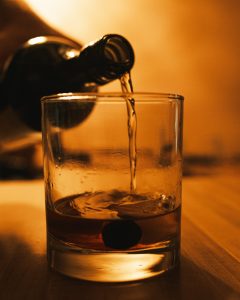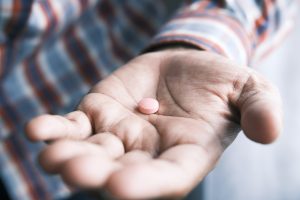Home » Help For Lortab Abuse » What Are the Effects of Combining Lortab & Alcohol?
What Are the Effects of Combining Lortab & Alcohol?

Lortab is a relatively harmless painkiller if used as directed and in isolation. Alcohol is also reasonably safe if you adhere to moderate drinking guidelines. The combined effects of mixing Lortab and alcohol, though, can bring about severe adverse outcomes requiring emergency medical treatment.
What Is Lortab?
Lortab is a prescription painkiller and CNS depressant containing a combination of the following ingredients:
- Hydrocodone: Hydrocodone is of the most commonly prescribed opioids for the treatment of moderate or severe pain by altering your perception of pain signaling.
- Acetaminophen: Acetaminophen is a common ingredient found in many over-the-counter pain relievers. The effects of this medication are intensified when it is mixed with hydrocodone in the form of combination medications like Lortab.
These two ingredients have different mechanisms of action for relieving pain. Hydrocodone prevents the CNS (central nervous system) from transmitting pain signals by binding to the brain’s naturally occurring opioid receptors. Acetaminophen, on the other hand, weakens the brain chemical responsible for stimulating your pain nerves.
Lortab in pill form has been discontinued in the United States, although a liquid formulation of Lortab is still available with a prescription.
What Is Alcohol?
Alcohol is a CNS depressant that can trigger permanent changes to the structure and function of the brain when abused.
As a psychotropic depressant of the CNS, alcohol slows down vital functions and impairs both neural activity and overall brain functioning. This occurs due to increased production of GABA (gamma-aminobutyric acid), a neurotransmitter or chemical messenger.
Consuming smaller quantities of alcohol initially triggers stimulant effects such as:
- Talkativeness
- Euphoria
- Boosted mood
- Raised blood pressure levels
- Increased heart rate
Consuming alcohol in greater quantities caused the depressant effects to manifest. These include:
- Slurred speech
- Loss of coordination
- Distorted perceptions
- Unsteadiness on feet
- Reduced inhibitions
If you’re still wondering, “Can I drink alcohol while taking Lortab”, we’ll now outline the effects of Lortab and alcohol mixed.
Signs and Symptoms of Combining Lortab and Alcohol
While Lortab and alcohol both induce individual side effects, many of these present similarly.
Symptoms of Alcohol Abuse
- Dizziness
- Weakness
- Impaired coordination
- Confusion
- Memory loss
- Loss of consciousness
- Vomiting
- Nausea
Symptoms of Lortab Abuse
- Vomiting
- Euphoria
- Itching sensation
- Problems with focus
- Mood swings
- Anxiety
What Are the Combined Effects of Lortab and Alcohol?

Both substances are CNS depressants. As such, combining the substances can inflame the symptoms of intoxication, with the side effects of both alcohol and Lortab presenting more rapidly and more severely. Additionally, polysubstance abuse can keep you from recognizing that you have consumed a potentially dangerous amount of either substance. This can provoke an overdose – more on this below.
Depressants can bring on dangerous side effects like shallow breathing and slowed heart rate. This can become a medical emergency in those who have consumed both alcohol and Lortab.
Combining these substances also heightens the risk of sustaining injuries while intoxicated. When mixing alcohol and Lortab, you are liable to experience:
- Impaired coordination
- Confusion
- Problems with concentration and focus
All of these factors can increase the likelihood of you being involved in an accident or an altercation.
Both Lortab and alcohol abuse can cause liver damage. Alcohol is notorious for triggering liver disease (cirrhosis). Lortab is especially dangerous in this regard due to the acetaminophen content of the drug. Acetaminophen may be safe in small doses, but higher doses of the substance can cause acute liver complications, including toxic liver disease (acetaminophen-induced hepatotoxicity). When you combine the substances, these risks are magnified. The chronic consumption of alcohol can reduce the threshold for liver toxicity, even when used as prescribed.
Beyond this, the misuse of alcohol and Lortab can pose health risks like alcohol poisoning (alcohol overdose).
Overdose is also a danger with any opioid-based medication like Lortab. Look out for these signs and symptoms of opioid overdose:
- Cold or clammy skin
- Pinprick pupils
- Slowed breathing (respiratory arrest)
- Low blood pressure
- Slowed heart rate
- Over-sedation
- Loss of consciousness
- Coma
Adding alcohol to the mix increases the risk of overdose as all effects of both alcohol and Lortab are intensified.
Avoid alcohol completely if you are taking Lortab or any other medication containing acetaminophen or hydrocodone.
Addiction to Alcohol and Lortab
Used in isolation, either Lortab or alcohol can be powerfully habit-forming. Combining the substances is likely to initiate a vicious cycle of dependence that is especially dangerous to those with a family history or personal history of substance abuse.
The sustained use of Lortab or alcohol provokes similar effects. Initially, tolerance to the substance builds, causing the effects of the substance to diminish as your body becomes accustomed to its presence. Often, this causes people to increase the amount of the substance consumed. Abusive patterns of consumption such as this will accelerate the development of physical dependence. When you become dependent on either alcohol or Lortab, you will require the substance to function normally, experiencing intensely uncomfortable withdrawal symptoms as the effects wear off.
Both tolerance and withdrawal are diagnostic criteria for addiction. Both alcohol use disorder and opioid use disorder are chronic and relapsing brain conditions. Fortunately, both conditions typically respond well to treatment with MAT (medication-assisted treatment) delivered alongside behavioral therapies like counseling and psychotherapy. We can help you kickstart a sustained recovery from addiction here at Gratitude Lodge.
Get Help for Alcohol and Lortab Abuse at Gratitude Lodge

Our affordable luxury rehab centers are located at:
Most people who have been abusing alcohol, Lortab, or both will benefit from a supervised medical detox. This streamlines the withdrawal process and minimizes the chance of complications during detox.
Following detoxification at our licensed medical detox facility, you can either move into a 30-day inpatient program or opt for an IOP (intensive outpatient program). If you have an addiction with a co-occurring mental health condition, we offer integrated and coordinated dual diagnosis treatment at all Gratitude Lodges.
Whatever level of treatment intensity most suits, you can access these pharmacological and behavioral interventions:
- MAT (medication-assisted treatment)
- Psychotherapy (talk therapies like CBT or DBT)
- Individual counseling
- Group therapy
- Holistic therapy
- Daily meetings
- 12-step immersion program
When you are ready to move beyond alcohol and Lortab addiction, reach out to the friendly team by calling 800-994-2184.
RESOURCES

Don’t Let Addiction Control You











